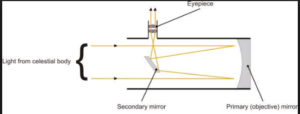Oracle IAS, the best coaching institute for UPSC/IAS/PCS preparation in Dehradun brings to you UKPCS Science (paper #6).
A telescope is an important tool for astronomy that gathers light and directs it to a single point. Some do this with curved mirrors, some with curved lenses, and some with both. Telescopes make faraway things look bigger, brighter and closer. Galileo was the first person to use a telescope for astronomy, but he did not invent them. The first telescope was invented in the Netherlands in 1608. Some telescopes, not mainly used for astronomy, are binoculars, camera lenses, or spyglasses.

The word “telescope” is usually used for light your eyes can see, but there are telescopes for “invisible” light. Infrared telescopes look like normal telescopes, but have to be kept cold since all warm things give off infrared light. Radio telescopes are like radio antennas, usually shaped like large dishes.
X-ray and Gamma ray telescopes have a problem because the rays go through most metals and glasses. To solve this problem, the mirrors are shaped like a bunch of rings inside each other so the rays strike them at a shallow angle and are reflected. These telescopes are space telescopes because not enough of this radiation reaches the Earth. Other space telescopes are put in orbit so the Earth’s atmosphere does not interfere.
Value Addition UKPCS Mains : Uttarakhand Special (Click Here)
UKPCS Mains Study Material subject wise
The notes are strictly as per UKPCS syllabus (topic wise):
Individual Polity Cost: Rs. 1500/- (including shipping)
Individual S&T Cost: Rs. 1500/- (including shipping)
Individual Geography Cost: Rs. 1500/- (including shipping)
Individual Economics Cost: Rs. 1000/- (including shipping)
Individual Ethics Cost: Rs. 1000/- (including shipping)
Individual History Cost: Rs. 1500/- (including shipping)
- Master Uttarakhand Current Affairs for UKPCS: CM Samvad & Monthly PDF Download - February 20, 2026
- UKPSC प्रारंभिक परीक्षा स्टडी मटेरियल 2026 (Upper & Lower) | Oracle IAS - January 3, 2026
- UKPCS 2026 प्री परीक्षा कोर्स : छात्रवृत्ति टेस्ट: Oracle IAS - December 30, 2025
